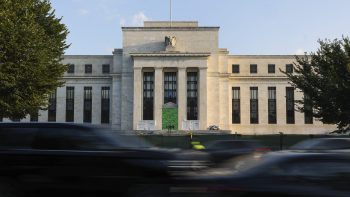
U.S. markets have been anticipating quantitative easing

TEXT OF STORY
Bob Moon: We still strive for global unity, but the U.S. isn’t too popular as the G20 — the Group of 20 Nations — gathered today in South Korea. They’re trying to hash out a plan for global economic cooperation, but many aren’t happy with the Federal Reserve’s moves to start pouring $600 billion into our economy to lower interest rates. Several developing countries fear the money will cause inflation and financial bubbles. And they may have a point.
As Marketplace’s Stacey Vanek Smith reports, the Fed’s policy hasn’t even taken effect, but it’s already pumping up some asset prices here at home.
Stacey Vanek Smith: The Fed’s quantitative easing plan may have been announced last week, but everybody’s pretty much known about it since August. Bill Stone, chief investment strategist for PNC Wealth Management calls it:
Bill Stone: The worst kept secret ever. Everyone knew it was coming when it actually came it was really just a question of how much they would do.
Stone says expectations of the Fed’s policy have been moving the markets since the summer. Interest rates have stayed low, reducing returns on traditionally safe investments like bonds and treasury bills. And that, he says…
Stone: Forces money out into riskier areas like stocks.
That’s exactly what’s been happening, says Nariman Behravesh, chief economist at IHS.
Nariman Behravesh: Households’ pension funds, mutual funds started to pile in big time into the stock market and that has pushed up the market quite a lot.
About 700 points. That’s how much the Dow Jones Industrial average has risen since August. Investors have also been trying to get ahead of the Fed’s move by going for gold — literally. Commodities analyst Dan Manternach.
Dan Manternach: Quantitative easing feeds fear of future inflation. It’s seen as basically just printing money. Gold is always a good hedge against inflation because no government can print more gold.
Manternach says gold prices have risen more than 20 percent since August. The surge of cash into the commodities market has raised concerns about a bubble. This week, the Chicago mercantile exchange raised the cost of trading to try and deter speculators.
In New York, I’m Stacey Vanek Smith for Marketplace.
There’s a lot happening in the world. Through it all, Marketplace is here for you.
You rely on Marketplace to break down the world’s events and tell you how it affects you in a fact-based, approachable way. We rely on your financial support to keep making that possible.
Your donation today powers the independent journalism that you rely on. For just $5/month, you can help sustain Marketplace so we can keep reporting on the things that matter to you.


















